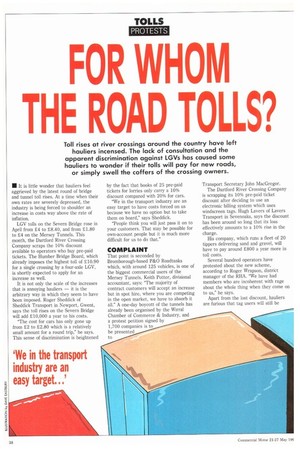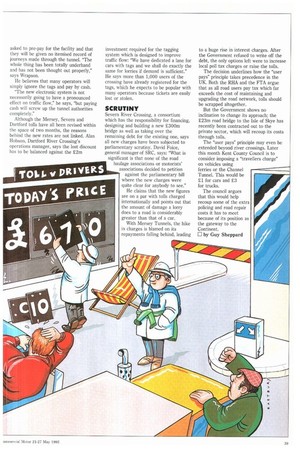FOR WHOM THE ROAD TOLLS?
Page 40

Page 41

If you've noticed an error in this article please click here to report it so we can fix it.
Toll rises at river crossings around the country have left hauliers incensed. The lack of consultation and the apparent discrimination against LGVs has caused some hauliers to wonder if their tolls will pay for new roads, or simply swell the coffers of the crossing owners.
• It is little wonder that hauliers feel aggrieved by the latest round of bridge and tunnel toll rises. At a time when their own rates are severely depressed, the industry is being forced to shoulder an increase in costs way above the rate of inflation.
LGV tolls on the Severn Bridge rose in April from £4 to £8.40, and from £1.80 to £4 on the Mersey Tunnels. This month, the Dartford River Crossing Company scraps the 10% discount available to operators who buy pre-paid tickets. The Humber Bridge Board, which already imposes the highest toll of £10.90 for a single crossing by a four-axle LGV, is shortly expected to apply for an increase as well.
It is not only the scale of the increases that is annoying hauliers — it is the arbitrary way in which they seem to have been imposed. Roger Sheddick of Sheddick Transport in Newport, Gwent, says the toll rises on the Severn Bridge will add £10,000 a year to his costs.
"The cost for cars has only gone up from £2 to £2.80 which is a relatively small amount for a round trip," he says. This sense of discrimination is heightened by the fact that books of 25 pre-paid tickets for lorries only carry a 10% discount compared with 20% for cars.
"We in the transport industry are an easy target to have costs forced on us because we have no option but to take them on board," says Sheddick.
"People think you will just pass it on to your customers. That may be possible for own-account people but it is much more difficult for us to do that."
COMPLAINT
That point is seconded by Bromborough-based P&O Roadtanks which, with around 125 vehicles, is one of the biggest commercial users of the Mersey Tunnels. Keith Potter, divisional accountant, says: "The majority of contract customers will accept an increase but in spot hire, where you are competing in the open market, we have to absorb it all." A one-day boycott of the tunnels has already been organised by the Wirral Chamber of Commerce & Industry, and a protest petition signed by 1,700 companies is to be presented
to
Transport Secretary John MacGregor.
The Dartford River Crossing Company is scrapping its 10% pre-paid ticket discount after deciding to use an electronic billing system which uses windscreen tags. Hugh Lavers of Lavers Transport in Sevenoaks, says the discount has been around so long that its loss effectively amounts to a 10% rise in the charge.
His company, which runs a fleet of 20 tippers delivering sand and gravel, will have to pay around £800 a year more in toll costs.
Several hundred operators have protested about the new scheme, according to Roger Wrapson, district manager of the RI-IA. "We have had members who are incoherent with rage about the whole thing when they come on to us," he says.
Apart from the lost discount, hauliers are furious that tag users will still be asked to pre-pay for the facility and that they will be given no itemised record of journeys made through the tunnel. "The whole thing has been totally underhand and has not been thought out properly," says Wrapson.
He believes that many operators will simply ignore the tags and pay by cash.
"The new electronic system is not necessarily going to have a pronounced effect on traffic flow," he says, "but paying cash will screw up the tunnel authorities completely."
Although the Mersey, Severn and Dartford tolls have all been revised within the space of two months, the reasons behind the new rates are not linked. Alan Hobson, Dartford River Crossing's operations manager, says the lost discount has to be balanced against the £2m investment required for the tagging system which is designed to improve traffic flow: "We have dedicated a lane for cars with tags and we shall do exactly the same for lorries if demand is sufficient." He says more than 1,000 users of the crossing have already registered for the tags, which he expects to be popular with many operators because tickets are easily lost or stolen.
SCRUTINY
Severn River Crossing, a consortium which has the responsibility for financing, designing and building a new £300m bridge as well as taking over the remaining debt for the existing one, says all new charges have been subjected to parliamentary scrutiny. David Foice, general manager of SRC, says: "What is significant is that none of the road haulage associations or motorists' associations decided to petition against the parliamentary bill where the new charges were quite clear for anybody to see."
He claims that the new figures are on a par with tolls charged internationally and points out that the amount of damage a lorry does to a road is considerably greater than that of a car.
With Mersey Tunnels, the hike in charges is blamed on its repayments falling behind, leading to a huge rise in interest charges. After the Government refused to write off the debt, the only options left were to increase local poll tax charges or raise the tolls.
The decision underlines how the "user pays" principle takes precedence in the UK. Both the RHA and the FTA argue that as all road users pay tax which far exceeds the cost of maintaining and upgrading the road network, tolls should be scrapped altogether.
But the Government shows no inclination to change its approach; the £23m road bridge to the Isle of Skye has recently been contracted out to the private sector, which will recoup its costs through tolls.
The "user pays" principle may even be extended beyond river crossings. Later this month Kent County Council is to consider imposing a "travellers charge" on vehicles using ferries or the Channel Tunnel. This would be for cars and for trucks.
The council argues that this would help recoup some of the extra policing and road repair costs it has to meet because of its position as the gateway to the Continent.
by Guy Sheppard




























































































